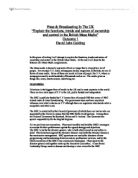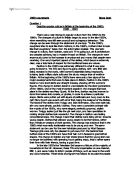The BBC was initially set up as a business but Reith changed this, putting into place the first ideals of public service broadcasting and therefore creating the very way in which the BBC would thereon develop.
Reith believed the BBC should become, “a national broadcaster, allowing news and events that had previously been accessible only to a minority of people, to become an everyday part of British life. He called it 'making the nation as one man'.”(EuropaWorld, 2001).
Reith had a very moralistic view of the standards of broadcasting. He believed it should, “offer the best of everything to everyone who cared to receive it.” (Briggs and Cobley, 2003, p124).
His philosophy of public broadcasting was based on four main points. He believed that the BBC, allowing that it was mainly funded by the licence fee, did not exist in order to profit.
He saw that it should provide to everyone in the community who wanted it and that it should, “maintain unified control as a monopoly which would resist sectional pressure, whether commercial or political.” (Briggs and Cobley, 2002, p.124).
He also believed that the BBC should aim to have the highest standards of programming. Reith was against commercial control. He believed that emphasis should instead be placed in improvement of moral standards and broadcasting standards and that these were both linked (Black, 2002, p.26).
His belief in the importance of these ideas resulted in the BBC becoming a public service corporation and he has been credited almost entirely for, “The shaping of public service broadcasting as an institution, and the acceptance by society at large of the form it assumed in Britain.” (Burns, 1977, p.37)
The First World War was important for creating acceptance of a ‘Public Service Utility’. This was because the Government took on a much more interventionist role during this time and it was then that the BBC was first formed.
The development of the public corporation “depended on the rejection of both market forces and politics in favour of efficiency and planned growth controlled by experts.”(Curran and Seaton, 2003, p112).
The BBC maintained their monopoly by being accepted by a large number of influential people as well as by the majority of the public who believed this was the way it should be ran.
The BBC also had support by being distanced from the capitalist industry; that is, making no profit or aiming to make profit, as well as being available for everyone.
The General Strike of 1926 was extremely important in the BBC’s development in a variety of different ways. The General Strike “shook the structure of the existing BBC to its very foundations.” (Boyle, 1972, p178). The Strike increased the number of the BBC’s listeners, allowed the BBC to consult its own news sources, saw the beginning of modern propaganda and saw the BBC start to censor itself.
These factors lead the BBC to emerge from the strike with, “A national audience and increased authority.”(Curran and Seaton, 2003, p.117). It was also after the General Strike that the BBC’s, “ethic of political neutrality” (Curran and Seaton, 2003, p.119) appeared.
The General Strike increased the BBC’s importance dramatically. With the print workers unionized and not working, the BBC staff, who was not in unions, carried on broadcasting and, with the absence of other sources of news, this became the main national news source (Briggs and Cobley, 2002, p.449).
Although there were perhaps only 2 million licence holders, this far underestimates the number of people listening to the BBC during the time as “communal listening” was a recognised feature of the strike, when people gathered together to listen to the news. (Curran and Seaton, 2003, p117).
The power that the press held prohibited this and also placed restrictions. News bulletins, for example, were only allowed to be broadcast in the evening so as to not harm newspaper sales. (BBC, 2004).
Until 1926 the BBC had not collected news from sources of its own. The BBC had previously relied on material from news agencies and official sources; however, the Strike changed this, indicating a very important point in the BBC’s development. It allowed the BBC to finally have a news service of its own. The BBC chose to report on both, “the strikers as well as the strike-breakers” (Curran and Seaton, 2003, p118).
The general strike is also viewed as the point when propaganda based on lies ended and the BBC is credited with inventing modern British propaganda.
The adoption of an ethic of political neutrality that the BBC took was also an important point in the BBC’s development. The BBC was supposed to be “independent and non-partisan” (Curran and Seaton, 2003, p.116).
When the British Broadcasting Company changed to a corporation, publicly appointed governors, viewed as trustees, replaced the directors of the once private company. The BBC was not intended to be accountable to the Parliament as neither Reith nor the Government wanted this.
Reith did not want broadcasting to be manipulated by politics whereas the Government did not want to have responsibility for what it may have deemed trivial (Curran and Seaton, 2003, p.177).
The General Strike was the first serious confrontation between the BBC and the Government. Winston Churchill wanted the Government to take over the BBC, which the Government had the right to do, but Reith resisted, believing that this would harm the confidence that the public had in the BBC as a public service broadcaster.
He eventually managed to convince Prime Minister Stanley Baldwin that this would indeed be against “national interest” (BBC, 2004).
However, during the Strike no representative from organized labour was allowed on the BBC, nor was Ramsay MacDonald, leader of the Opposition, in a ban by the Government. Reith strongly disagreed with this as did the public who did not believe that government could impose on the BBC whilst still claiming it was not involved. (Curran and Seaton, 2003, p119).
The BBC also had to learn how to censor itself during the Strike. This was in order to “forestall government intervention.” (Curran and Seaton, 2003, p119).
However, it often was that the BBC had to pass off Government intervention as a decision made by itself. Curran and Seaton use the example of Pollitt and Mosley in 1935. The BBC had proposed to broadcast talks by both a communist and a fascist, Harry Pollitt and Sir Oswald Mosley.
However, Government did not want to allow this as Pollitt had recently made a speech that the Government deemed inappropriate. It was eventually decided that the programmes would not be broadcast. The BBC then required the government’s permission to say why the programmes would not be aired. The Government replied with strict guidelines on what could be said so as not to create further embarrassment for the Government.
Television broadcasting arrived in 1936 when the BBC opened the first high-definition TV service. This was despite the doubts of Reith who, “never saw the value of television.” It quickly developed between 1936 and 1939, although the first landmark broadcasts of important events such as King George VI’s coronation procession was only viewed by around 10, 000. However, television continued to develop at a rapid rate in its early years leading up to the second world-war and provided a new direction for the BBC to take.
Because of the BBC the idea of ‘mass media’ became a working product, reaching out to the nation as no other form of communication had in the past.
The distinctive ways in which the ideals of the BBC came to fruition during this period and the way that it was subsequently ran made the role of the media vitally important in society.
The most important developments came under the leadership of the first director of the corporation, John Reith. His belief in high moral standards being linked with high broadcasting standards resulted in the set of ‘Reithian principles’ that the BBC is still bound to today.
The standards and beliefs he strived to implement along with the invention of the licence fee resulted in the BBC becoming a public service broadcaster and therefore shaped the way the BBC was run in the most important way. This lead the BBC to adopt its ethic of political impartiality, resulting in an unbiased news service which the public felt it could trust.
The General strike also proved to be distinctive in the development of the mass media for a number of different reasons. It was during the strike that the audiences grew dramatically increasing the importance and the power of the BBC extensively. The General Strike also indicated the first point that the BBC was allowed to have its own news service and didn’t rely on other sources, as well as having to censor itself in order to avoid interventions by the government.
The role of the media in Britain at this time is inextricably linked to the BBC. It is impossible to discuss the roles of both independently as the BBC was the only mass media in Britain at this time.
The BBC took on the role of the impartial but moral observer in a way which no media had done before and reached out to the people of Britain. To this day Britain is renowned for the BBC and the role it played in the history of modern media.
Bibliography
BBC (17/12/03) 1920’3 – Behind the scenes. Available from:
, (Accessed 26/05/07)
BBC (06/08/04) History of the BBC. Available from: 26/05/07)
Black, Jeremy (2000) Modern British History: Since 1900, Palgrave MacMillan
Boyle, Andrew (1972) Only the Wind will Listen, Hutchinson and Co.
Briggs, Adam and Cobley, Paul (2002) The Media: An Introduction, Pearson Education Limited
Burns, Tom (1977) The BBC – Public Institution and Private World, London: MacMillan Press
Curran, James and Seaton, Jean (2003) Power without responsibility, London: Routledge
EuropaWorld (12/01/01) John Reith – Lord Reith of Stonehaven. Available from: , (Accessed 27/05/07)







